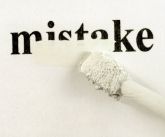 Whatever business we’re in, we have busy schedules. Sometimes we don’t even have much time to read a book, practice sports or even to enjoy lunch with friends. We need to rush from one engagement to another, complete tasks within deadlines and most importantly make no mistakes. If we make mistakes, it would take at least the double time and effort to get everything straightened and worst of all is the feeling of guilt and devastation after committing the mistake. Why?
Whatever business we’re in, we have busy schedules. Sometimes we don’t even have much time to read a book, practice sports or even to enjoy lunch with friends. We need to rush from one engagement to another, complete tasks within deadlines and most importantly make no mistakes. If we make mistakes, it would take at least the double time and effort to get everything straightened and worst of all is the feeling of guilt and devastation after committing the mistake. Why?
Well, we’re raised by our parents to be almost-perfect creatures. As we grow up, we were told to do the right things and avoid mistakes. Starting from first grade our teachers kept telling us ‘listen to instructions, study hard, do not repeat your mistakes.’ In other words, we are trained all our lives to stick to the right things and conduct an error free life. How much pressure results from it? Especially when we do make mistakes… the stress level is so high that we could freak out and harm ourselves for not being so perfect.
Yesterday, I watched a TED Talk by Kathryn Schulz, the author of “Being Wrong: Adventures in the Margin of Error.” She also writes interviews with high-profile people about how they think and feel about being wrong. She addressed an audience of overachievers – CEOs, scientists, entrepreneurs – an elite global group. Her speech made these people think of their few mistakes… the fear of committing mistakes I must say. Schulz categorized the way we deal with people who make mistakes in a nutshell. First, we pull the ignorant card: If we see that someone’s mistaken, our initial instinct is to educate the person and show him what is right. After our explanation if the person insists on not understanding his mistake, we start questioning his intelligence. We think that he is not smart enough to understand. The other option is that the person has some sort of hidden agenda, he is evil or bad intentioned not to see the truth.
Believing that there is only one truth is conform with the Western scientific approach. We are trained to believe that if our perception based on facts reflect reality, we are right. This way, we all think alike, act alike. We favor the truth and veto mistakes. Not much room for alternative thinking, creativity, marginality…. We don’t let our creativity free of judgment and constraints. We are not willing to see that there are different interpretations to reach the very same truth. I enjoy reading Hindu mythology where there is a rich world of more than 4,000 Gods and Goddesses with different personalities, missions, strengths and weaknesses. Because Hindus are practical people, they tend to personify Gods as human beings and pray to the ones that they feel closest to their heart. Although they have favorite Gods, this doesn’t mean that they don’t respect, worship and fear the others.
Hindus know that there is one formless God that take different shapes to reach out for people. In other words, they believe in one eternal truth but many ways to reach the same truth. So, instead of committing to one strict path, they choose any path that will take them to the right address. Some people take the long way, some prefer the short cut. However, everyone witnesses the wrong and the right along the journey.
 How different is this approach from the Western view! There are an infinite number of options ahead of you. You are free to make your own decisions and surprisingly mistakes are welcome. In fact, even Gods and Goddesses are welcome to make mistakes. One of the famous myths is about the elephant headed God Ganesha. Ganesha is the son of Parvathy and Shiva. As the God of destruction, Shiva is rigorously worshipped and feared by the majority of Hindus. In Shiva’s case, destruction is not a bad thing, he is the destructor of the evil and ignorance. You should always remember that one needs to destroy bad things in order to reconstruct good things. According to the legend, Shiva was most of the time out meditating and fighting against the evil. His wife Parvathy was at home by herself, she was getting really bored. She wanted to have a baby so that she could play with him and take care of him. She created a baby out of her body and named him Ganesha. One day, she asked Ganesha to guard the door and not to let anybody in while she was having a bath. All of a sudden, her husband Shiva came back home and found Ganesha at the door. Ganesha insisted not to get Shiva in. Without knowing who this boy was, Shiva got truly furious and chopped off Ganesha’s head. Hearing the fight, Parvathy got off the bathroom and found Ganesha headless on the floor. It was her turn to get furious and devastated this time. She ordered Shiva to immediately find a way to reanimate Ganesha. Shiva left the house shocked. His plan was to get the head of the first animal he encountered. It was an elephant. He chopped off the head of the elephant and assembled with the body of Ganesha. In the end, Shiva’s mistake resulted in the creation of one of the most popular Gods in the Hindu pantheon. If you ever visit a Hindu Temple, Ganesha is the one who will greet you at the very entrance. He will help you get rid off all the obstacles as you get in the temple to cleanse your soul.
How different is this approach from the Western view! There are an infinite number of options ahead of you. You are free to make your own decisions and surprisingly mistakes are welcome. In fact, even Gods and Goddesses are welcome to make mistakes. One of the famous myths is about the elephant headed God Ganesha. Ganesha is the son of Parvathy and Shiva. As the God of destruction, Shiva is rigorously worshipped and feared by the majority of Hindus. In Shiva’s case, destruction is not a bad thing, he is the destructor of the evil and ignorance. You should always remember that one needs to destroy bad things in order to reconstruct good things. According to the legend, Shiva was most of the time out meditating and fighting against the evil. His wife Parvathy was at home by herself, she was getting really bored. She wanted to have a baby so that she could play with him and take care of him. She created a baby out of her body and named him Ganesha. One day, she asked Ganesha to guard the door and not to let anybody in while she was having a bath. All of a sudden, her husband Shiva came back home and found Ganesha at the door. Ganesha insisted not to get Shiva in. Without knowing who this boy was, Shiva got truly furious and chopped off Ganesha’s head. Hearing the fight, Parvathy got off the bathroom and found Ganesha headless on the floor. It was her turn to get furious and devastated this time. She ordered Shiva to immediately find a way to reanimate Ganesha. Shiva left the house shocked. His plan was to get the head of the first animal he encountered. It was an elephant. He chopped off the head of the elephant and assembled with the body of Ganesha. In the end, Shiva’s mistake resulted in the creation of one of the most popular Gods in the Hindu pantheon. If you ever visit a Hindu Temple, Ganesha is the one who will greet you at the very entrance. He will help you get rid off all the obstacles as you get in the temple to cleanse your soul.
Now, you can better understand the vivid colors, funny dances and silly dialogues in the Bollywood movies. I believe the steady growth of the Indian economy is not only a result of rapidly developing service expertise and cheap labor but also a free thinking philosophy engrained in each Hindu.
 Ela Erozan Gürsel writes a weekly column named “Değişim Yelpazesi ” on global business trends for Dünya Gazetesi on behalf of Datassist for almost two years. Her feature topics include: green energy; climate change; impacts of financial crisis on companies, sectors and regions; innovative technologies in sciences, human resources and management; social networks transforming business and politics; changing dynamics of marketing and branding.
Ela Erozan Gürsel writes a weekly column named “Değişim Yelpazesi ” on global business trends for Dünya Gazetesi on behalf of Datassist for almost two years. Her feature topics include: green energy; climate change; impacts of financial crisis on companies, sectors and regions; innovative technologies in sciences, human resources and management; social networks transforming business and politics; changing dynamics of marketing and branding.
She also writes articles for international magazines published in Singapore.
Prior to her writing career, she worked at Datassist as a Project Manager in a project that combines human resources and mobile communications with the aim to connect blue-collar workers and employers through mobile phones. Before engaging in this exciting project, she was in pharmaceutical sales working for a multinational company. She graduated from American University, Washington, DC, majoring in International Studies with a concentration on International Business and Europe. She worked in Washington D.C. as an Account Manager at a boutique telemarketing firm that specializes in fund raising and publication renewals. She speaks Turkish, English, French, and Spanish. She currently resides in Singapore with her husband.
 Turkish Labor Law
Turkish Labor Law



